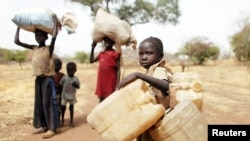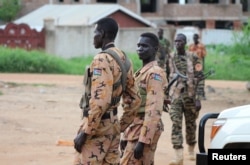The United Nations refugee agency reports that 100,000 people are effectively trapped by violence in the South Sudanese town of Yei. With no one allowed in or out, it warns, the town could soon face a food shortage.
Until recently, Yei — located in Central Equatoria state — has been largely spared from the violence and attacks that have gripped South Sudan since December 2013.
But, the UNHCR says, conditions for the inhabitants of Yei and surrounding areas have deteriorated since renewed conflict between government and rebel forces broke out in July.
UNHCR spokesman William Spindler says the situation came to a head earlier this month when more than 30,000 people in surrounding areas flocked to Yei, following deadly attacks and looting of property.
He tells VOA that government forces are surrounding the town.
"They are restricting access into the town and also preventing people from leaving — presumably because they suspect them of siding with opposition forces,” Spindler said. “Now people are not allowed to leave to go and tend to the fields and the crops. And this potentially could be disastrous."
If farmers are unable to reach their fields, Spindler says, harvests will rot, the upcoming planting season is likely to be missed and there will be no crops next year.
He says the displaced already are feeling the sting of having had to abandon their homes, with food prices soaring as commodities disappear from the market.
"Many internally displaced people have reported that their food stocks have been looted,” Spindler said. “Two local hospitals are functioning at reduced capacity. Lack of high-energy food for malnourished children and breastfeeding mothers is becoming critical."
Aid agencies in Juba are responding by gathering food, non-food items, drugs and other essential supplies, he says. However, the operation is stalled as agencies wait to be granted access to Yei.
The situation adds to the humanitarian crisis in South Sudan, where some 2.5 million people have been displaced from their homes since the conflict began.





